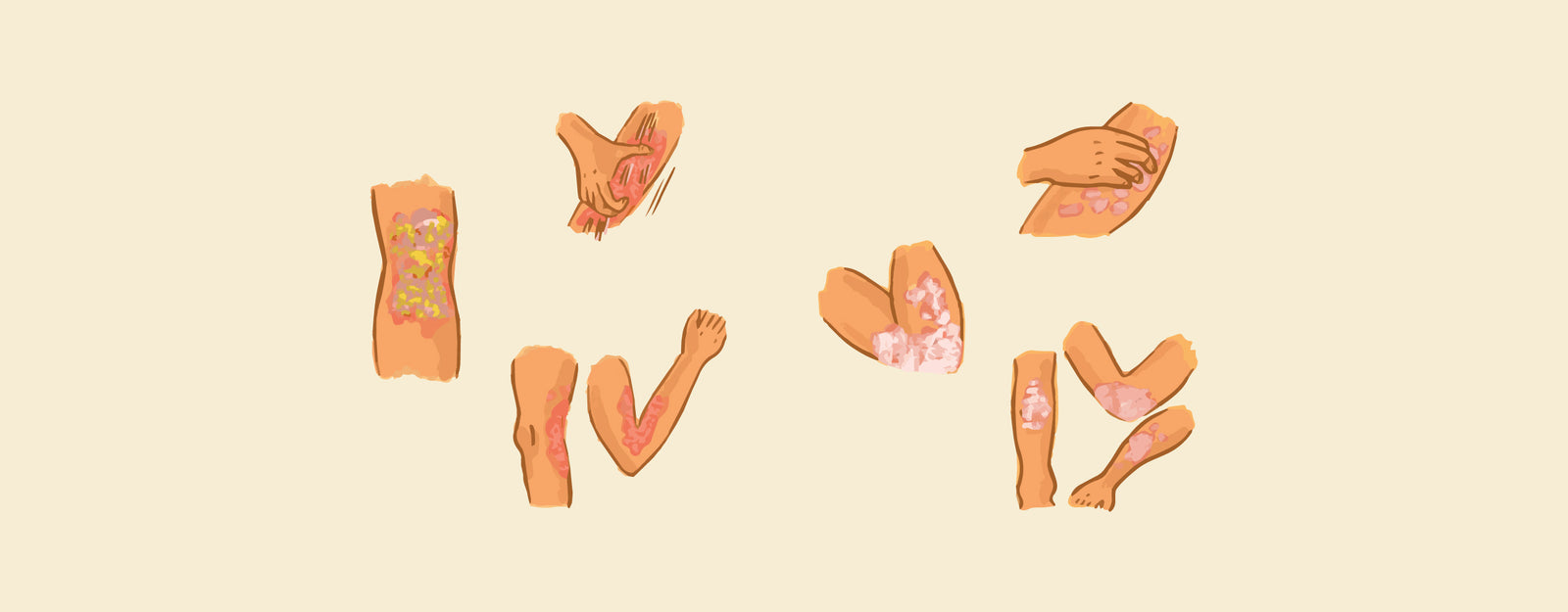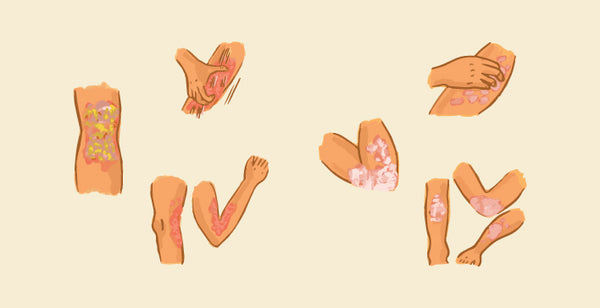Difference between Seborrheic Dermatitis vs Psoriasis vs Eczema: Seborrheic Dermatitis, Psoriasis, and Eczema are skin conditions with unique characteristics. Seborrheic Dermatitis is characterized by using red, infected skin including white or yellow scales, usually affecting regions like the scalp, face, and chest. Psoriasis arises as thick, red patches of pores and skin with silvery scales, regularly appearing on the elbows, knees, scalp, and lower again. Eczema manifests as red, itchy, and infected skin, with dry, scaly patches or weeping sores usually located at the face, hands, and joints. Each circumstance has its very own reasons and remedy options, necessitating proper analysis and tailor-made control from healthcare experts.
Difference between Seborrheic Dermatitis vs Psoriasis vs Eczema
Seborrheic Dermatitis exhibits purple, inflamed skin with white or yellow scales; Psoriasis presents thick, pink patches with silvery scales; Eczema showcases red, itchy pores and skin with dry patches or weeping sores, requiring distinct treatments tailored via healthcare experts. The table below gives the differences between Seborrheic Dermatitis, Psoriasis and Eczema.
|
Aspect |
Seborrheic Dermatitis |
Psoriasis |
Eczema (Atopic Dermatitis) |
|
Cause |
Overgrowth of yeast, genetics, immune response |
Autoimmune disorder, genetic predisposition |
Genetic, immune dysfunction, environmental |
|
Symptoms |
Red, inflamed skin with greasy or yellow scales |
Thickened, red patches with silvery scales |
Red, itchy, inflamed skin with dry patches |
|
Affected Areas |
Scalp, face (nose, eyebrows), upper chest |
Scalp, elbows, knees, lower back, nails |
Flexural areas (inside elbows, knees), face |
|
Triggers |
Hormonal changes, stress, cold weather |
Stress, skin injuries, infections, medications |
Allergens, irritants, stress, weather |
|
Treatment |
Medicated shampoos, topical corticosteroids |
Topical corticosteroids, phototherapy |
Moisturizers, topical corticosteroids |
|
Chronic Nature |
Chronic or recurrent |
Chronic or recurrent |
Chronic or recurrent |
|
Itching |
Present, can be severe |
Present, can be severe |
Present, can be severe |
|
Inflammation |
Present |
Present |
Present |
|
Scalp Involvement |
Common |
Common |
Less common but possible |
|
Genetic Predisposition |
Possible |
Yes |
Yes |
|
Contagious |
No |
No |
No |
Browse The Best Scrubs Collection!
What is Seborrheic Dermatitis?
Seborrheic dermatitis is a common inflammatory skin condition that primarily affects areas of the body with a high density of oil glands, such as the scalp, face, and upper chest. It is characterized by red, itchy, and inflamed skin covered with greasy or yellowish scales.
Causes of Seborrheic Dermatitis
- Yeast Overgrowth: The presence of a yeast known as Malassezia on the skin is assumed to play a role in Seborrheic Dermatitis. While this yeast is naturally present in the pores and skin, an overgrowth of it can trigger an inflammatory response in inclined people.
- Hormonal Factors: Hormonal modifications, consisting of fluctuations in hormone ranges during puberty, pregnancy, or with positive scientific situations, may additionally affect the development of Seborrheic Dermatitis.
- Genetics: There is evidence to suggest that genetics can also predispose individuals to Seborrheic Dermatitis. People with their own family records of the condition can be much more likely to expand it themselves.
- Environmental Factors: Certain environmental elements, along with the weather, dry air, stress, and fatigue, can exacerbate Seborrheic Dermatitis signs. Additionally, a few skincare products or hair care products containing harsh chemicals might also trigger or get worse the situation.
- Immune System Dysfunction: Dysfunction of the immune device may also contribute to the improvement of Seborrheic Dermatitis. An odd immune reaction to Malassezia or other triggers may lead to irritation and skin symptoms.
Symptoms of Seborrheic Dermatitis
- Redness: Areas stricken by Seborrheic Dermatitis often appear reddened, especially round the rims.
- Flaky Skin: One of the main symptoms is the presence of flaky, white or yellow scales at the pores and skin. These scales can be dry or greasy, relying at the character.
- Itching: Seborrheic Dermatitis can cuse itching, which may additionally vary from moderate to excessive and might lead to discofort and inflammation.
- Inflammation: The affected areas may display symptoms of irritation, together with swelling, tenderness, and warmth.
- Greasy or Oily Skin: In a few cases, the pores and skin tormented by Seborrheic Dermatitis may appear greasy or oily, specially on the scalp.
What is Psoriasis?
Psoriasis is a long-term, autoimmune skin disorder marked by a fast accumulation of skin cells that cause red, thick areas covered in silvery scales. Although these so-called plaques can appear anywhere on the body, the elbows, knees, scalp, lower back, and genitalia are the most often affected areas. Although the precise origin of Psoriasis is unknown, immune system, environmental, and genetic factors are thought to be involved. Psoriasis can lead to dry, cracked skin, itching, and discomfort. In certain instances, it can also impact the nails and joints, resulting in changes to the nails and pain in the joints.
Causes of Psoriasis
- Skin Trauma or Injury: Cuts, scratches, and sunburns are examples of areas where Psoriasis lesions might occasionally appear. The Koebner reaction is the name given to this phenomenon.
- Illnesses: Psoriasis symptoms have been linked to the development or exacerbation of some illnesses, most notably streptococcal infections. Streptococcal throat infections, in particular, have been linked to guttate Psoriasis, a type of Psoriasis characterised by small, droplet-shaped lesions.
- Stress: It has been shown that psychological stress might make some people's Psoriasis symptoms worse. Psoriasis flare-ups can be brought on by or made worse by stressful life events, continuous stress, or emotional anguish.
- Alcohol and Smoking: It has been determined that drinking too much alcohol and smoking are two possible risk factors for Psoriasis. People who smoke or drink alcohol excessively may be more susceptible to developing Psoriasis or experiencing more severe symptoms.
- Medication: In vulnerable patients, some medications, including lithium, beta-blockers, antimalarial drugs, and nonsteroidal anti-inflammatory drugs (NSAIDs), may cause or exacerbate Psoriasis symptoms.
Symptoms of Psoriasis
- Red Skin Patches: Elevated, inflammatory skin patches are a common symptom of Psoriasis. These patches are usually pink or red, though they can vary in size and shape. They could show up as separate lesions or combine to form bigger plaques.
- Silvery Scales: Due to the fast skin cell turnover, the afflicted skin frequently develops silvery-white scales. These scales are easily detached and can land on clothing or the skin's surface.
- Discomfort: Psoriasis patches have the potential to cause discomfort and irritation due to their itching. In addition to exacerbating symptoms, scratching the afflicted area may result in bleeding or infection.
- Dry and Cracked Skin: Psoriasis can lead to dry, cracked skin that is prone to fissures.
What is Eczema?
Eczema is a continual pores and skin condition characterized by infection, itchiness, and redness of the skin. It commonly appears as patches of dry, scaly, or thickened pores and skin that may be followed by oozing or crusting. Eczema can occur everywhere on the body but is often found on the hands, feet, face, elbows, and knees.
Causes of Eczema
- Genetics: Eczema has a tendency to run in families, suggesting a genetic predisposition to the condition. Certain gene mutations may disrupt the skin's capability to offer an effective barrier towards irritants and allergens, leading to inflammation and Eczema.
- Immune device disorder: People with Eczema frequently have an overactive immune reaction to triggers. .
- Environmental factors: Various environmental elements can trigger Eczema signs and symptoms. These can also include exposure to irritants such as harsh soaps, detergents, sure fabrics, or chemical substances. Additionally, dry air, excessive temperatures, and coffee humidity ranges can worsen Eczema signs by way of drying out the skin.
- Allergens: Allergens which include pollen, dirt mites, pet dander, mildew, and certain meals can cause allergies in individuals with Eczema, leading to pores and skin infection and flare-ups.
- Stress: Emotional stress can exacerbate Eczema symptoms or cause flare-ups. Stress can weaken the immune device and disrupt the skin's barrier function, making it extra at risk of infection and inflammation.
Symptoms of Eczema
- Itching: Itching is regularly the most outstanding symptom of Eczema. It may be severe and chronic, leading to scratching, which can further worsen the pores and skin and exacerbate inflammation.
- Dry, sensitive pores and skin: Individuals with Eczema often have dry skin this is prone to infection and flares. The skin may additionally experience tough, scaly, or cracked, specifically during flare-ups.
- Red or infected skin: Eczema commonly reasons regions of redness and irritation on the pores and skin, in particular in the creases of the elbows, knees, neck, face, and fingers. These areas may seem swollen, warm to the touch, or may additionally ooze fluid in extreme cases.
- Rashes or patches of indignant skin: Eczema can lead to raised, bumpy rashes or patches of angry pores and skin that may vary in length and form. These rashes can be purple, brown, or grayish in shade and can form crusts or scales over the years.
- Thickened or leathery skin: In chronic cases of Eczema, repeated scratching and inflammation can cause thickening of the skin. The affected pores and skin may also turn out to be rough.
Shop Best Lab Coats From Here!
Similarities between Seborrheic Dermatitis, Psoriasis amd Eczema
- Inflammation: All three conditions involve infection of the pores and skin, despite the fact that the underlying causes of infection might also vary. Inflammation in those situations ends in redness, itching, and soreness.
- Chronic or recurrent nature: Seborrheic Dermatitis, Psoriasis, and Eczema are all chronic or recurrent conditions, that means they could persist over the years.
- Itching: Itching is a common symptom shared by means of all three conditions. It can vary from mild to extreme and may significantly impact high-quality of life.
Order the Best Jogger Scrub From Here!
| Check out More Articles | |
| Difference Between Cartilage And Bone | |
| Difference Between Endocrine And Exocrine Glands | |
| Difference Between Cell Wall And Cell Membrane | |















